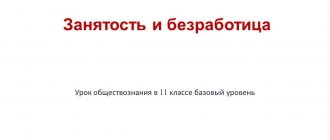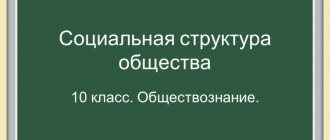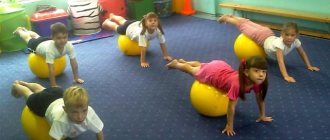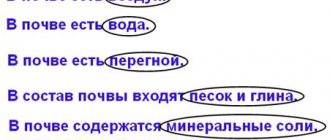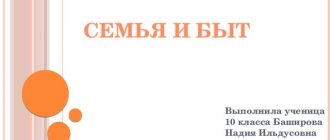On this page you will find examples of tasks for the Social Studies Olympiad. Here are test questions and open questions that will force 10th grade students not only to repeat the material studied in class, but also to analyze what they have learned and be able to apply their knowledge in solving various problems. Thus, using this material, schoolchildren will prepare for the Olympiad and will be able to achieve high results. The presented set of tasks for the Social Studies Olympiad can be used equally successfully both in 10th grade lessons and during self-study. Students will be able to self-assess themselves by checking the correct answers and solutions written at the bottom of the page.
- Test tasks
- Open questions
- Answers to tests
- Answers to discovery questions
Social Studies Olympiad 10th grade
Download the assignments by filling out the form!
After you provide the data, the download button will become active.
Test tasks
1. The essence of the problem of “North” and “South” is A) the growth of cultural diversity B) the formation of a network of international terrorist organizations C) the depletion of natural resources C) the gap in the level of economic development of the regions of the planet
2. Man influences nature: A) his influence has no consequences B) favorably C) unfavorably D) both favorably and unfavorably
3. A characteristic feature of industrial society is A) the weakness and underdevelopment of democratic institutions B) the predominance of collective consciousness over the individual C) the predominance of private ownership D) the widespread use of non-economic forced labor
4. A. Toynbee formulated the law of: A) unity and struggle of opposites B) “challenge - response” C) change of socio-economic formations D) class struggle
5. Are the following judgments about self-knowledge true? 1 – The ideal “I” is the idea of how others want me to be. 2 — An integral part of self-knowledge is self-esteem. A) both judgments are incorrect B) only the second is correct C) both judgments are correct D) only the first is correct
6. In cognitive activity, in contrast to labor: A) the subject is an individual B) the means must correspond to the goals C) the goal is to obtain reliable knowledge D) the result is a new product
7. The commonality of language, beliefs, customs, symbols is inherent in A) elite B) mass C) national D) everyday culture 8. Are the following judgments about self-education correct? Self-education can be done for 1 - distance learning. 2 - increasing the individual level of culture. A) both judgments are true B) both judgments are false C) only the second is true D) only the first is true
9. The goal of the rule of law is A) the creation of a vertical power B) the formation of a legal culture of society C) the development of mechanisms to curb inflation D) the creation of a legislative system
10. Supreme power in state N. is inherited. What additional information will allow us to conclude that state N. is an absolute monarchy? A) parliament approves the annual amount allocated for the maintenance of the court B) the monarch is the supreme commander in chief C) the power of the monarch has no legal restrictions. D) the monarch approves the head of the cabinet
Business game in social studies, first place
Center for the Development of Social and Humanitarian Education "Encyclopedist"
All-Russian Scientific and Pedagogical Conference
“Modern techniques and methods in organizing educational activities
schoolchildren and students"
Section: “Modern social studies lesson”
Business game
“Civil society and the state. Formation of civil society institutions in the Russian Federation"
Author: Anna Vladimirovna Darkina, Ph.D. ist. sciences,
Teacher I KK
GBPOU VO "Voronezh Legal College"
"Encyclopedist" https://znania5.ru
2015-2016
Introduction
Social studies lesson on the topic “Civil society and the state. The Formation of Civil Society Institutions in the Russian Federation” is aimed at systematizing knowledge on topics related to the formation of political ideology (in particular, liberalism) and the essence of democracy. The lesson presents a brief summary of what students should do and how, and the mechanisms for conducting the lesson are consistently presented. Each stage of the lesson is planned taking into account the requirements of the Federal State Educational Standard for Secondary Professional Education (implementation of basic and professional competencies) and is described in as much detail as possible, taking into account the age, psychological and other characteristics of the children. The type, equipment, and objectives of the lesson are introduced at the beginning of the design. In conclusion, a memo is provided that defines the criteria for assessing work in the lesson. A clearly defined algorithm of work allows students with different levels of basic training to understand the sequence of tasks and better express themselves directly in class.
Lesson type: practical lesson
Equipment: board, projector, diagrams
Lesson objectives:
Educational:
1. Get acquainted with the basic concepts on the topic: civil society, institutions of power, and also recall the already known ones - democracy, parliamentarism.
2. Reveal trends in the development of dialogue between the state and civil society.
3. Describe the basic principles of building civil society in the Russian Federation.
Educational:
Develop the ability to work with documents, search and systematize information on a topic, analyze and draw conclusions, rationally solve problematic problems, and participate in discussions.
Educators:
To form an attitude towards the problems of civil society in our country, to recognize civil society as part of the political system of the state, to understand the danger of confrontation between individual segments of civil society.
During the classes
Organizing time.
1. Greeting. Identification of missing persons.
2. Checking students' readiness for the lesson.
3. Creating a friendly creative atmosphere.
Introductory speech by the teacher. Determining the goals and objectives of the lesson.
Part one. Introduction.
2-3 students prepare a report on the topic “Features of the formation of civil society in different countries.” In order to more fully reveal the topic, a brief excursion into history is offered - when (from what time) civil society began to form in Europe (as well as in eastern countries and in Russia). Why at this time? What does civil society look like there now? What's happening in Russia now? What are the reasons for this situation?
(Maximum time consumption – 15 minutes)
Part two. The actual game.
The teacher gives recommendations for students, which are as follows: firstly, at this stage the students set the time consumption on their own, and secondly, for this, it is advisable to rehearse the lesson in their free time, taking into account the recommendations.
The first group is representatives of the church. Students are independently divided into representatives of faiths - for example, someone will choose the role of an Orthodox priest, another student will choose a Buddhist monk, and a third will choose the imam of a mosque (Islam).
The guys’ task is to prove that their group is an integral part of civil society in modern Russia and is shaping democracy in our country,
To do this, it is recommended to answer the questions
:
- What steps are you taking to form democracy in the Russian Federation? (i.e., what exactly are you doing? This could be meetings and consultations with other segments of civil society in the Russian Federation: political parties, media, non-governmental organizations, as well as consultations with government structures on relevant issues - the Presidential Office, for example. Or maybe you build churches - then it’s worth explaining how this initiative of yours shapes citizenship and democracy.)
- How do you build relationships with each other? (That is, dialogue between Orthodox Christians, Muslims, Jews, Buddhists in the Russian Federation). How does this contribute to the development of democracy in the Russian Federation?
- Is there any resistance to your work? What does this mean? How do you deal with this? (Perhaps government agencies “do not hear” you - that is, you make certain statements, but they ignore you.)
There is no need to read out the questions themselves during the lesson - students form their speech based on the answers to them.
After the first group has spoken, questions are asked from the audience (representatives of other members of civil society - all students must express themselves to the maximum in the game. Hereinafter referred to in the text as “Questions from the audience”).
The second group speaks - representatives of independent media (including Internet publications)
The task of the students - see the task of the church representatives (above)
To do this, the group answers the questions:
see questions from church representatives (above).
The specifics of completing the task at this stage should be indicated separately:
1) What steps are you taking to form democracy in the Russian Federation? (i.e., what exactly are you doing? Perhaps you create your own websites, where you post relevant information about the importance of developing democracy in the Russian Federation; maybe you actively meet with party representatives, church leaders, non-profit organizations, etc. - whatever , show your imagination. Perhaps this is some kind of consultation with the authorities.)
2) How do you build relationships with each other? Let's say one of you is a representative of the print media, and another is a representative of the electronic media. What problems arise here? How do you resolve them?
3) Is there any resistance to your work? What does this mean? How do you deal with this?
Questions from the audience
The third group speaks - representatives of political parties.
The algorithm of work (answers to questions, see above) is the same + problem
(given in order to facilitate your preparation and clarify the progress of work in the lesson) :
How does the state help you form democratic values and bring them to the attention of the population of the Russian Federation? What do you do in case of obvious absenteeism (removal of voters from voting)?
Questions from the audience
(prepare your own).
Speech by the fourth group - representatives of non-profit organizations (hereinafter referred to as NPOs).
The algorithm of work (answers to questions, see above) is the same + problem:
According to a number of experts, NGOs in the Russian Federation are sponsored from abroad, which harms the development of democratic institutions within the Russian Federation? What are you doing to convince the authorities?
Questions from the audience.
The fifth group completes the work - representatives of the social movement (optional).
The algorithm of work (answers to questions, see above) is the same + problem:
Is dialogue between the state and civil society possible in our country? Under what conditions?
Questions from the audience.
Shutdown. Final reflection.
Students are encouraged to ask questions: how did the lesson go? What new things did you learn? What conclusions did you come to on your own? What interested you? Next, it is expected to sum up the results and assign grades. You can give the children the opportunity to analyze the course of the lesson, its stages and the personal contribution of each participant and, based on the data obtained, evaluate the work of each one. Thus, on the one hand, the goals set at the beginning of the lesson are achieved: educational
(get acquainted with the basic concepts on the topic: reveal trends in the development of dialogue between the state and civil society; characterize the basic principles of building civil society in the Russian Federation);
developing
(to develop the ability to work with documents, to search and systematize information on a topic, to analyze and draw conclusions, to rationally solve problematic problems, to participate in discussions) and
educational
(to form an attitude towards the problems of civil society in our country, to recognize civil society as part of the political system state, understand the danger of confrontation between individual segments of civil society), on the other hand, understanding the diversity of practices in conducting practical classes in the discipline “Social Studies”, aimed at the comprehensive development of a future specialist.
Memo
Criteria for assessing student responses
— Excellent rating
is awarded in the following cases: active work in the lesson, the answer is complete, logically consistent, the culture of speech is observed, the speech is literate, there are no “parasite” words, the student answers possible additional questions on the topic without hesitation.
— Rated "good"
is given if there are one or two inaccuracies in the answer and insufficient activity in the lesson. Speech is generally literate; Some inconsistency in the answer is allowed, but only minor.
— Rating "satisfactory"
is given in cases where: activity in the lesson is minimal, the speaker’s speech is confusing, the student confuses concepts, cannot answer additional questions on the topic, the answer lacks logical and cause-and-effect relationships, and there are several gross factual or other errors.
— Rating "unsatisfactory"
is given in cases where a student refuses to answer or does not answer the question asked.
Bibliography
- Agranat D. L. Civil society in Russia: problems of formation // materials of reports of the International youth scientific conference “Civil society in the era of global informatization” November 20–21, 2009. Electronic resource: https://rikmosgu.ru/students/informatization/Agranat/
- Levakin I.V. Modern Russian statehood: problems of the transition period // State and Law. 2003. No. 1. P. 5–13
- Levashov V.K. Civil society and democratic state in Russia // SOCIS. 2006. No. 4. P. 6–20
- Romanenko L. M. There is already a civil society in Russia, but... // Sociological Research. 2004. No. 4. pp. 12–16.
- Tuzikov A.R. Ideas of democracy: sociological interpretation // SOCIS. 2005. No. 3. P. 35–38

